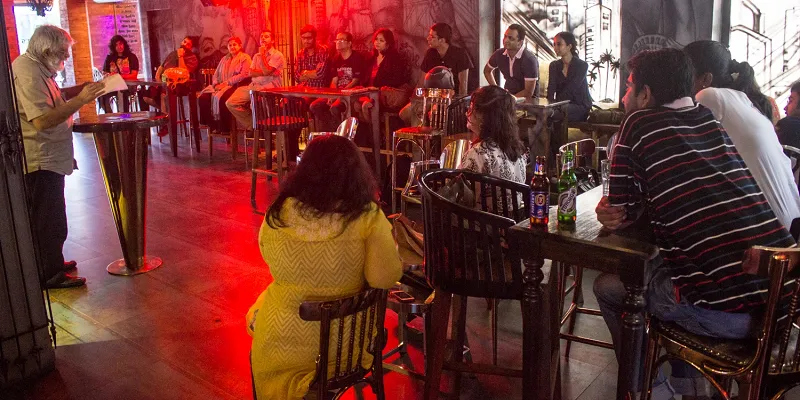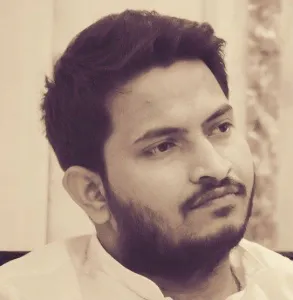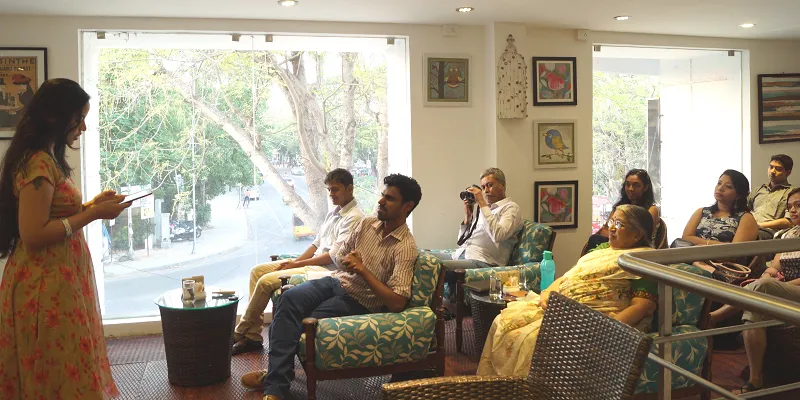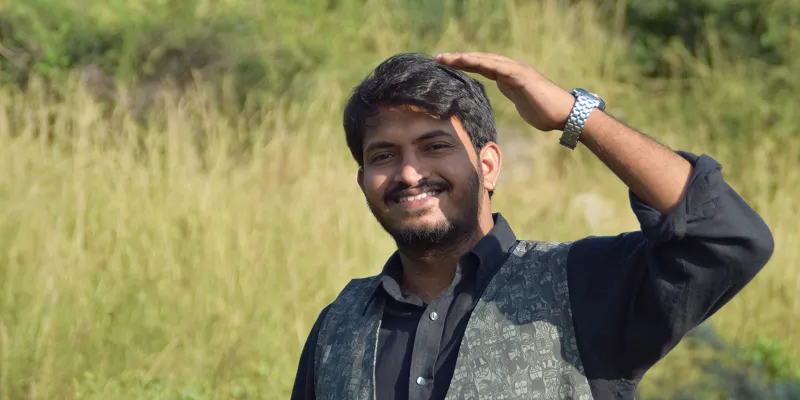Raghavendra Madhu’s Poetry Couture takes poetry off the shelves and brings it back into people’s lives
"We don't read and write poetry because it's cute. We read and write poetry because we are members of the human race. And the human race is filled with passion. And medicine, law, business, engineering, these are noble pursuits and necessary to sustain life. But poetry, beauty, romance, love, these are what we stay alive for."
- Dead Poet's Society

India’s stand-up comedy scene is thriving. Audiences are willing to pay a hefty sum to watch these comedians perform. Stand-up comics today live with greater dignity than ever before. Now compare stand-up comedy with poetry. Through poetry, audience can experience more than just one emotion of laughter. They can experience every human emotion - joy, sorrow, love, pain, drama and truth. This makes it intellectually stimulating as well as entertaining. If audiences are willing to pay to watch the stand-up comics perform, why should the same not be tried in the field of poetry?
Well, Poetry Couture is an organisation which is attempting precisely the same thing. It wants to elevate poetry recitals to the level of stand-up comedy scene, where people are willing to buy tickets to help poets sustain. In only fourteen months since its inception, Poetry Couture has already become one of India’s largest pro-bono poetry initiatives, and is currently running across five cities- Delhi, Mumbai, Chennai, Kolkata and Jaipur. They have already organised over forty significant events.
Poetry Couture was started by Raghavendra Madhu. A few years ago, he had attended a closed poetry recital where there was no allocation for open mic. A young boy who had come to the event wanted to recite but was not allowed to. It set Raghavendra thinking that there are people out there who would like to share their poetic flair but are unable to do so because of negligible social initiatives in poetry and allied art. He shared the idea of starting a poetry reading group in Delhi with one of his friends, Kavita Fadnis. Within no time, she got him a restaurant in Delhi to start with their very first session. Since then, there has been no looking back.
The child is father of the man

Raghavendra had an interesting childhood. He was born and brought up in sub-urban Kolkata. Being a Tanjavur-Maharashtrian, his childhood was an insane amalgamation of cultural facets. They spoke in a morphed Marathi interjected with Tamil words and cooked rasam and sambar every day. Raghavendra recalls,“As a child, I aspired to be a bus-conductor, thought it was cool to hang off a speeding bus and getting to decide when to stop. It may be because I come from a humble background, but I find biggest joy in smallest of things.”
Raghavendra has many similar pleasant memories of his teenage years: diving into their local pond from frangipani branches, catching crabs, and whiling away afternoons throwing stones aimed at tender mangoes and proudly sharing them with his grandmother for pickling. As he had working parents, he would mostly be on his own. He would often play with the children living off streets and neighbouring slums and fondly remembers the game of rolling discarded cycle tyres down the road, whilst running along. All these experiences later culminated in him becoming a poet.
I wandered lonely as a cloud
Raghavendra had many early influences in poetry. Apart from some of Kabir’s couplets, two of the poems that stayed with him ever since school were Dushyant Kumar’s Kuchh Bhi Ban Bas Kayar Mat Ban and T.S. Eliot’s Macavity: The Mystery Cat. He started with writing juvenile verses. At times he would write in the adoration of the lives of peanut vendors on crowded suburban trains, and sometimes he would write in awe of the scintillating morning lotus in his shallow village pond. He says,
“Poetry is to me what religion is to a priest. I thought of poetry as a passing phase of my life in my early twenties. I hurled it and was walking away, like a boomerang it came back and hit me hard in my head making me artistically bruised for life. And now, poetry is an essential nutrient to the soul and leaves me ‘soulivating’ for more.”
After he started Poetry Couture, Raghavendra faced numerous challenges. It was difficult for him to take time away from his full-time job as a public health professional. Hundreds of emails and messages to relevant people went into void. He received personal attacks too. Some English poets who claimed authority on the language quoted his couplets like ‘She hash-tagged me / and I hash-tagged her / She lost track of hash sticks / and I turned into that blue bird on Twitter’ saying these were preposterous. At the same time, he would receive praise for the same controversial poems from younger poets.

To strive, to seek, to find, and not to yield
All these challenges culminated into making Poetry Couture better, which was an attempt to take poetry beyond the silo mentality. Raghavendra doesn’t believe in groups. He believes in movements. When he started, he did not only think of Poetry Couture as a space for the ‘artiste-at-heart’ people to engage in creative art forms, but a movement to revive free art spaces in cities which were increasingly dwindling. Partnerships with similar art groups and foundations to promote modern ways of expressing poetry became the spine of what they do.
Another novel idea that was emphasised by Poetry Couture was the bringing together of senior poets and open mic recitals. This was envisaged in order to give an improved understanding of poetry and an opportunity to listen to poets whom they otherwise had only read. It simultaneously motivated young poets as they got to read alongside senior ones.
“My idea of poetry is honesty in the written form, beyond forms or mere use of an obfuscated lexicon. I live by poems and quotes such as Auden’s ‘If equal affection cannot be, Let the more loving one be me,’ or Whitman’s ‘I believe a leaf of grass is no less than the journey-work of the stars,’ or even Dali’s ‘I don't do drugs. I am drugs’.”
Not with a bang but a whimper
The movement started by Poetry Couture looks to bringing poetry off the shelves and into the lives of people. In one their most ambitious projects, Poetry Couture tried to link poetry and sustainable society by bringing in the idea of making lives more art-inclusive. The one-of-its-kind discussion involved renowned poets like Keki Daruwalla, Manglesh Dabral and Farhat Ehsas, and the initiative was awarded the Microsoft Create to Inspire Fellowship to sensitise colleges and universities on environmental sustainability through poetry in Kolkata. This event was spearheaded by volunteers and poetry lovers in the city, including Joie Bose, Ananya Chatterjee, Saira Shah Halim, Arthur Cardozo and Ashoke Viswanathan.
In the past fourteen months, Poetry Couture has done over 40 events, driven mostly by volunteers. One of their volunteers, Abhipsa Gaur, has hosted quite a few open mics in Mumbai. They have curated readings at cafes, restaurants, art galleries and spaces like American Consulate, New Delhi and Chennai and National Gallery of Modern Arts, Government of India. Raghavendra says,
“At one of our first open mic readings at The Brew Room Café, Chennai, I was surprised to hear one of the participating poets, Devendran, announce that he had once attended a Poetic Adda in Delhi and he loved it. After returning to Chennai he tried forming a spoken-word group called Mocking Birds. Instances like these were the biggest fuel and compliments.”
Poetry Couture does online events too, and does not shy away from any sort of partnerships. They have engaged in unusual collaborations such as Shaadi.com’s social initiative ShaadiCares to raise awareness against child marriage, dowry and domestic violence.

But I have promises to keep
While most poets prefer keeping to themselves and leading a quiet life, Raghavendra is a gush of fresh air in India’s poetry scene driven primarily by youngsters. He is a poet and an entrepreneur. When asked about his journey as an entrepreneur, Raghavendra says,
“It has been tremendously empowering being a social entrepreneur, but one could only wish the world organised itself merely on social capital. The movement bridges the gap between art and art lovers. The beginning of Poetry Couture in Delhi’s café was about the love for poetry, but building it from there to the poetic grandiosity it has become today has to do more with entrepreneurship than poetry. From networking and outreach to forming lucrative collaborations, identifying opportunities of growth to replicating and scaling, everything is about entrepreneurship and every step of the journey has helped me evolve into an entrepreneur.”
Going forward, Poetry Couture is planning to explore multi-lingual poetry as a mode of entertainment and bring it to the level of stand-up comedy scene in India. Raghavendra is also working towards a startup, for-profit arm in the art space which will be the major source of funding for Poetry Couture. The for-profit company will be fulfilling the gap between creative art and mainstream audience through offline and online services. Additionally, Raghavendra is also evaluating options of fundraising, crowdsourcing, and sponsorships through partnerships to add to the sustainability of Poetry Couture.







